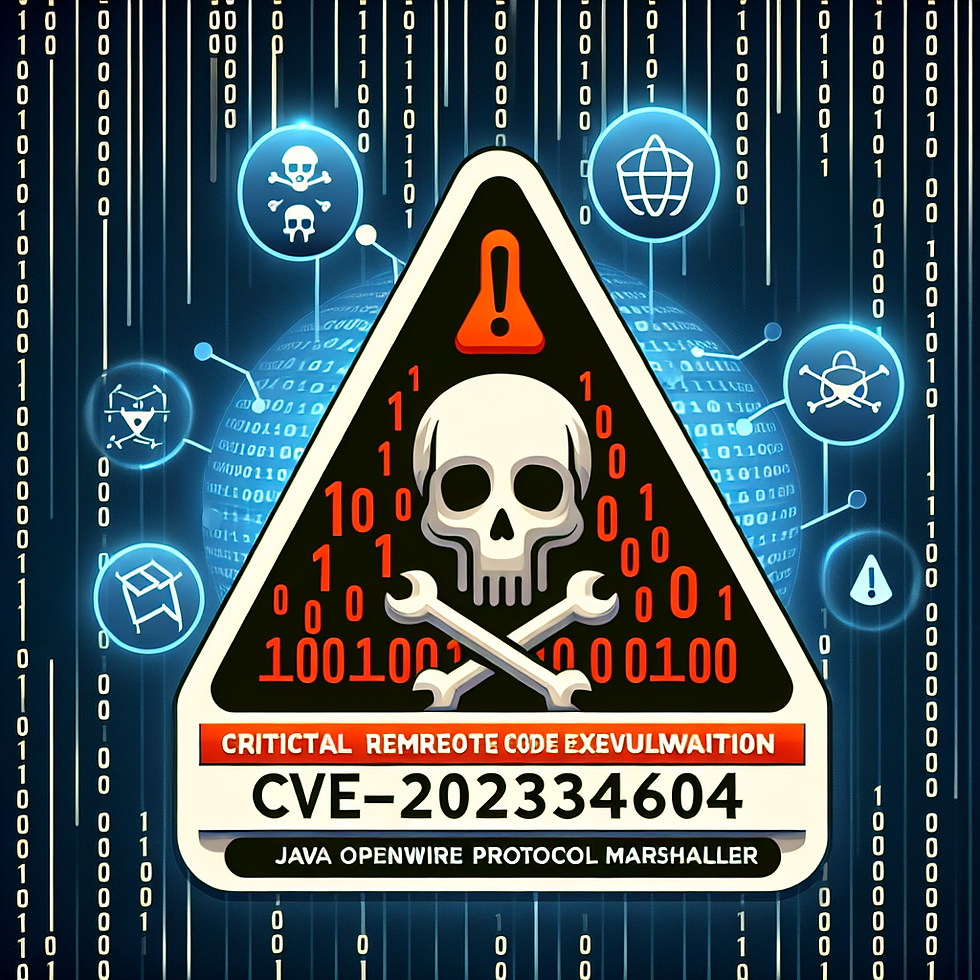Critical CVE-2023-46604: Remote Code Execution Vulnerability in Apache ActiveMQ Exploited by Kinsing Malware
- Rescana
- Oct 2, 2024
- 3 min read

Executive Summary
CVE-2023-46604 is a critical Remote Code Execution (RCE) vulnerability affecting the Java OpenWire protocol marshaller in Apache ActiveMQ. This vulnerability allows a remote attacker with network access to either a Java-based OpenWire broker or client to run arbitrary shell commands. With a CVSS score of 9.8, this vulnerability is of utmost concern due to its potential for severe impact. Notably, the Kinsing malware group has been actively exploiting this vulnerability to deploy cryptocurrency miners and other malicious software on compromised systems. This report provides a detailed analysis of CVE-2023-46604, including technical information, exploitation in the wild, affected product versions, mitigation strategies, and references to relevant sources.
Technical Information
Vulnerability ID: CVE-2023-46604
The primary cause of this vulnerability is a lack of validation in the deserialization process. Deserialization is the process of converting input data back into an object. If this process is not properly secured, it can allow attackers to inject malicious code. In the case of CVE-2023-46604, the Java OpenWire protocol marshaller in Apache ActiveMQ fails to validate input data during deserialization, enabling remote attackers to execute arbitrary shell commands.
The vulnerability affects multiple versions of Apache ActiveMQ, specifically versions 5.18.0 before 5.18.3, 5.17.0 before 5.17.6, 5.16.0 before 5.16.7, and 5.15.0 before 5.15.16. Users are strongly advised to upgrade both brokers and clients to the latest versions to mitigate this issue.
Exploitation in the Wild
CVE-2023-46604 has been actively exploited in the wild. The Kinsing malware group has been leveraging this vulnerability to download and execute cryptocurrency miners and other malware on vulnerable systems. The Kinsing group exploits this vulnerability to gain remote access and execute arbitrary commands, leading to the installation of cryptocurrency miners.
Indicators of Compromise (IOCs): - Malware: Kinsing cryptocurrency miner - TTPs: - T1059.004: Command and Scripting Interpreter: Unix Shell - T1203: Exploitation for Client Execution - T1071.001: Application Layer Protocol: Web Protocols
APT Groups using this vulnerability
The Kinsing malware group is known for targeting sectors such as cloud environments and containerized applications. They have been actively exploiting CVE-2023-46604 to deploy cryptocurrency miners and other malicious software. The group's activities have been observed in various regions, including North America, Europe, and Asia.
Affected Product Versions
The following versions of Apache ActiveMQ are affected by CVE-2023-46604: - Apache ActiveMQ 5.18.0 before 5.18.3 - Apache ActiveMQ 5.17.0 before 5.17.6 - Apache ActiveMQ 5.16.0 before 5.16.7 - Apache ActiveMQ 5.15.0 before 5.15.16
Users are recommended to upgrade both brokers and clients to version 5.15.16, 5.16.7, 5.17.6, or 5.18.3 which fixes this issue.
Workaround and Mitigation
- Patch and Update: Apply the latest security patches provided by Apache ActiveMQ. The vendor has released updates to address this vulnerability. More information can be found at the Apache ActiveMQ Security Advisory.
- Network Segmentation: Isolate critical systems and services to limit the potential impact of exploitation.
- Monitor and Detect: Implement monitoring solutions to detect unusual activities and potential exploitation attempts. Use intrusion detection systems (IDS) to identify malicious traffic.
References
Rescana is here for you
At Rescana, we understand the critical importance of staying ahead of cybersecurity threats. Our Continuous Threat and Exposure Management (CTEM) platform helps customers identify, assess, and mitigate vulnerabilities like CVE-2023-46604. We are committed to providing you with the tools and insights needed to protect your organization from emerging threats. If you have any questions about this report or any other issue, please do not hesitate to contact us at ops@rescana.com.
.png)


